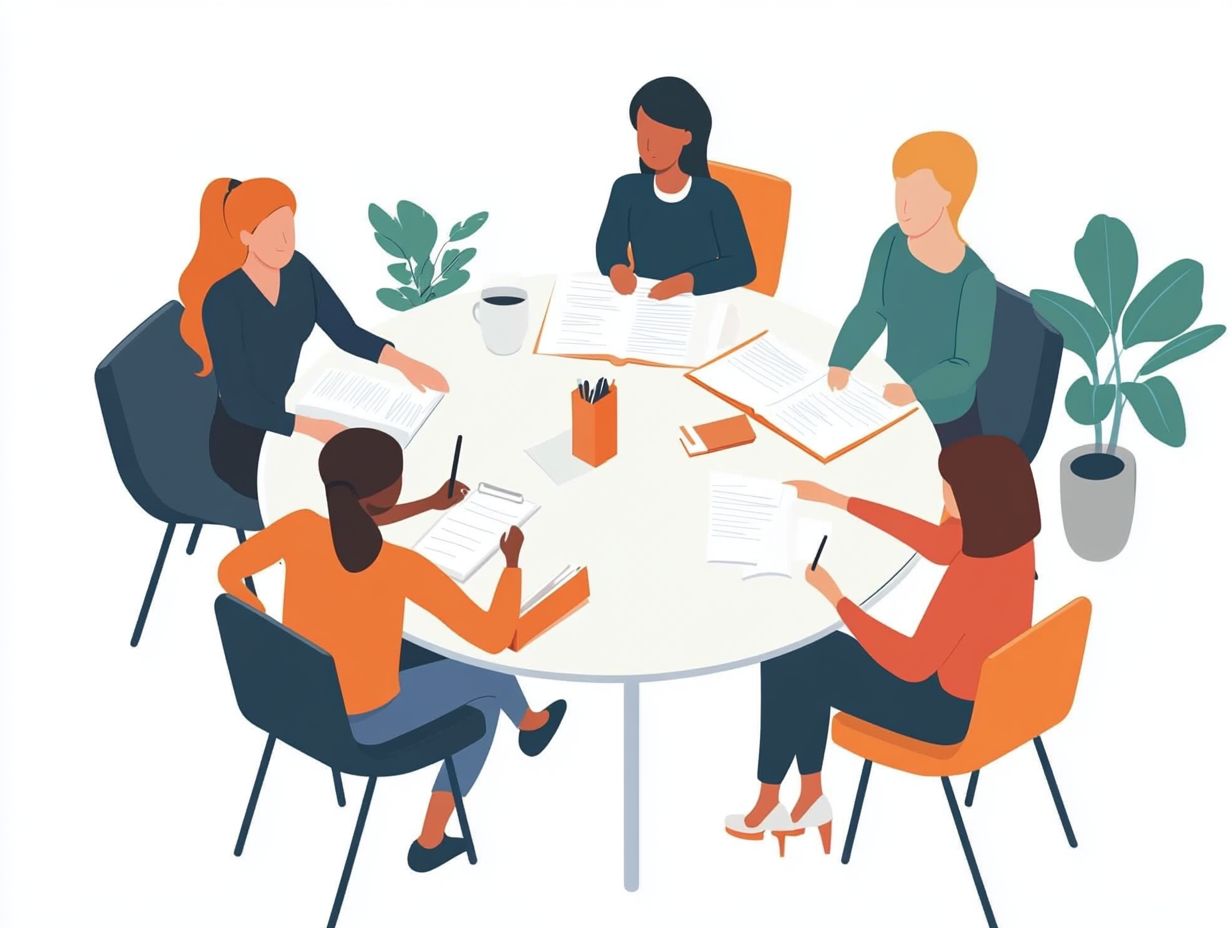Understanding Pro Bono Legal Services
Pro bono legal services are a lifeline for those in need, ensuring everyone has a fair shot at justice. They provide essential support for individuals who might struggle to afford legal representation.
This article explores the definition and purpose of pro bono work. It outlines who qualifies for these invaluable services and the various types available.
You ll find guidance on accessing these resources, insights into the benefits for both clients and lawyers, and the challenges that may arise along the way.
Explore how pro bono legal services can empower individuals and fortify communities, making a meaningful difference in many lives.
Contents
Key Takeaways:

Pro bono legal services are free legal help offered by lawyers and law firms to individuals and organizations in need.
Eligibility for pro bono services may vary, but generally, those with limited financial resources facing legal issues qualify.
Pro bono legal services cover a wide range of legal areas and can be accessed by following certain steps, providing benefits for both clients and lawyers.
What are Pro Bono Legal Services?
Pro bono legal services refer to free work done by lawyers to help those in need. These services aim to serve the public good and ensure access to justice for people who need help but can’t afford it.
These services play a crucial role in the legal system. They enable individuals who cannot afford legal representation to receive the assistance they need.
Many volunteer lawyers participate in these efforts through nonprofit organizations and legal clinics. They support community engagement while addressing various legal challenges faced by individuals in need.
Definition and Purpose
The essence of pro bono legal services lies in the voluntary provision of professional legal assistance without financial compensation. This practice reflects the ethical duty of legal professionals to serve the community.
These services are crucial for meeting the legal needs of people who need help but can’t afford it. Pro bono initiatives enable individuals grappling with legal challenges and enhance the stability of entire communities.
By delivering essential legal aid, professionals guide clients through complex issues like housing, civil rights, and family law, fostering a sense of security and justice.
These initiatives reinforce community connections and promote equality, underscoring that access to legal resources is fundamental to societal advancement.
Who Qualifies for Pro Bono Legal Services?
To qualify for pro bono legal services, you typically need to meet certain requirements to acknowledge the financial challenges faced by individuals or communities needing legal assistance.
This approach greatly enhances your access to justice, ensuring that those who require help can receive it without the burden of financial strain.
Eligibility Requirements
Eligibility for pro bono legal services often revolves around income thresholds and specific legal issues that align with the mission of nonprofit organizations offering these valuable services.
These criteria typically target individuals whose income falls below a certain percentage of the federal poverty level, prioritizing legal assistance for the most vulnerable segments of the population.
The types of legal challenges considered can vary significantly, often covering issues such as:
- Domestic violence
- Immigration
- Housing disputes
- Other critical matters that profoundly impact one s quality of life
By establishing these guidelines, organizations can effectively allocate resources and direct support toward those who truly need assistance. This approach fulfills the overarching goal of promoting justice for all, regardless of financial capability.
Types of Pro Bono Legal Services

Pro bono legal services cover a broad spectrum of offerings designed to address diverse legal needs. These include court representation, expert legal advice, advocacy, and support through legal clinics.
Each service is crafted to enhance social responsibility and ensure access to justice for all.
Examples and Common Areas of Law
Common areas of law that greatly benefit from free legal help include family law, housing issues, and immigration. In these fields, legal representation can profoundly impact the lives of underserved populations.
Take family law, for instance. Pro bono attorneys often step in during custody disputes, ensuring the best interests of children are prioritized an essential factor in unstable environments.
In terms of housing-related legal aid, these services help individuals facing eviction. They allow people to keep their homes and stabilize their communities.
In the realm of immigration law, free legal help guides newcomers through complex processes, assisting them in securing vital visas or protection. This not only enhances their lives but also enriches the community as a whole.
By providing crucial support, pro bono efforts address immediate legal challenges while also providing a sense of security and dignity among clients. Ultimately, this weaves a stronger, more cohesive societal fabric.
How to Access Pro Bono Legal Services
Start today by reaching out to nonprofit organizations, legal clinics, and volunteer programs specifically designed to offer legal assistance.
Taking these steps will help you find the right resources tailored to your needs.
Steps to Finding and Utilizing Services
Finding and utilizing free legal help begins with a bit of research into local resources. Look for legal aid organizations and community pro bono programs.
To navigate this process effectively, start by conducting online searches for area-specific legal aid directories. These directories can provide a comprehensive list of available services.
Obtaining referrals from community centers, social workers, or trusted friends can also be invaluable. Personal recommendations often lead to the most reliable programs.
Don’t overlook legal clinics hosted by law schools. They can offer significant support, as many students work under the guidance of experienced attorneys.
By being proactive and tapping into both online and community resources, you can access the legal assistance necessary to address your unique situation.
Benefits of Pro Bono Legal Services
Free legal help provides substantial benefits, extending beyond the clients who receive assistance. As an attorney, you gain the opportunity to enhance your skills, expand your professional network, and cultivate a deeper sense of social responsibility.
Advantages for Clients and Lawyers

The advantages of free legal help are substantial. Clients receive accessible legal representation, leading to improved outcomes in their legal challenges while helping underserved populations.
By receiving these essential services, clients navigate the legal system more effectively. They contribute to a fairer society and foster community engagement and social responsibility.
When you have dedicated legal advocates by your side especially during challenging times like facing eviction or navigating family law disputes you often experience a significant reduction in stress and anxiety.
The benefits also extend to the legal practitioners involved. They frequently discover that pro bono work enhances their skills, broadens their professional networks, and deepens their understanding of unique societal issues.
Together, these efforts enhance the community s legal literacy and cultivate a more equitable environment for everyone.
Challenges and Limitations of Pro Bono Legal Services
Even with the admirable goals driving free legal help, you may encounter several challenges and limitations that can impede their effectiveness.
These include resource constraints, overwhelming demand, and varying levels of engagement from lawyers.
Don’t hesitate! Reach out for free legal help if you’re facing challenges.
Potential Issues and Solutions
Potential challenges in pro bono legal services often revolve around case management difficulties and the pressing need for systematic approaches to enhance the efficiency of legal representation for clients. These issues can lead to frustrating delays in justice and may undermine the effectiveness of such noble initiatives.
Inadequate resources and insufficient training for volunteers can complicate matters further. This highlights the importance of implementing structured frameworks.
Embracing technology, like software that helps lawyers track their cases, can revolutionize your pro bono work! It can streamline processes and significantly enhance communication and collaboration among legal practitioners.
Establishing ongoing training programs is crucial. This enables volunteers to acquire essential skills needed to address the diverse needs of clients, fostering improved outcomes within the pro bono community.
Frequently Asked Questions
What are pro bono legal services?
Pro bono legal services are free legal help provided by lawyers to those who can’t afford it.
Why do lawyers offer pro bono services?

Lawyers also have a duty to offer pro bono services as part of their profession, giving back to their community and helping those in need.
Who can qualify for pro bono legal services?
Generally, pro bono legal services are available to individuals and organizations with limited financial resources who cannot afford legal representation. However, eligibility requirements may vary depending on the specific program and the area of law involved.
What types of legal services are covered under pro bono programs?
Pro bono programs can help with family law, immigration, housing, employment, and criminal defense. Some may also offer legal education and advice clinics.
How do I find pro bono legal services in my area?
To find pro bono services, contact your local bar association or legal aid society. These organizations often have lists of pro bono programs and lawyers who offer such services. You can also search online for programs in your community.
What should I expect when seeking pro bono legal services?
When seeking pro bono legal services, expect to provide information about your legal issue and financial situation. The program or lawyer may conduct an initial screening to determine your eligibility and the type of legal assistance you need.
It is important to communicate openly and honestly with the pro bono lawyer to ensure that you receive the best possible assistance.






